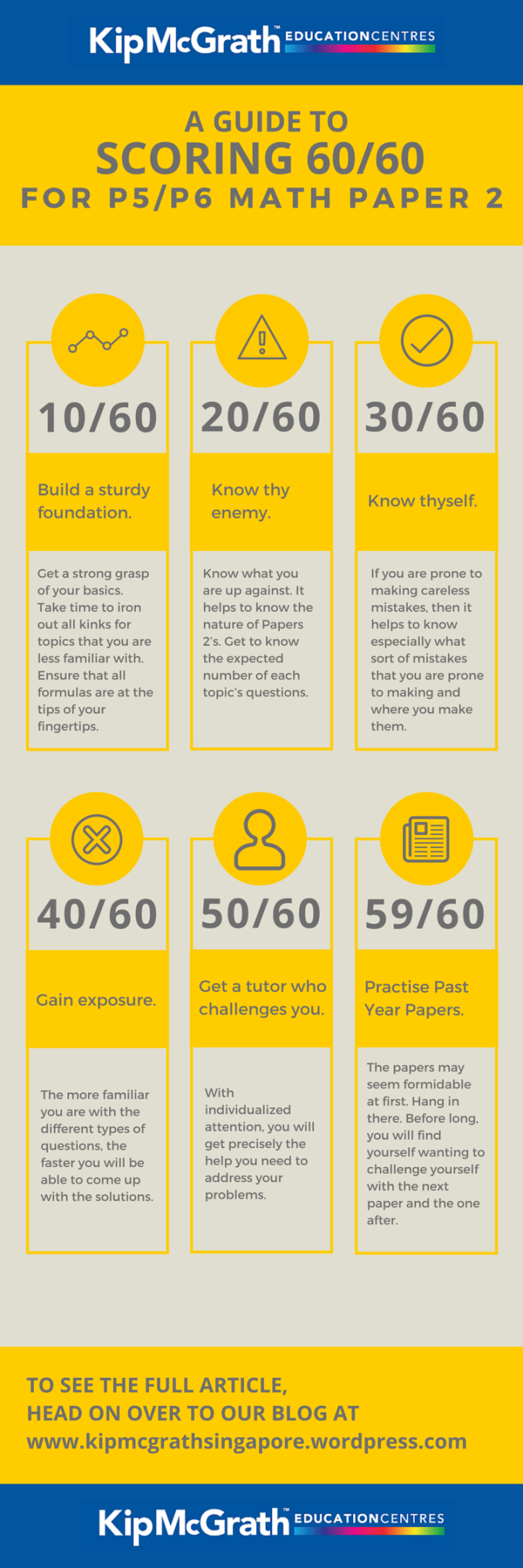When it comes to Math at Primary 5 / 6 or PSLE level, most students have no problems with Paper 1. However, it is Paper 2 that terrifies them. The open-ended nature of the questions often leave them apprehensive and uneasy. A full 60/60 for their Math Paper 2 may seem like an unassailable feat; one that is reserved for just the Math whizzes in class.
The good news for those who have yet to attain such feats – Full marks in Paper 2 does not happen by chance nor pure talent.
With diligence and perseverance, combined with the right attitude and incorporating the tips found below, you will be on your way to scoring full 60 marks in your next exam.
The tips are separated into two parts. In both parts, you will find good habits and practices. Keeping in mind that it is still April, there should be ample time to internalise the tips below and try to implement them.
In Part 1, we share some of the things you can do right now to start preparing yourself to hit 60 marks for Math Paper 2.
In Part 2, we share the things you will need to keep in mind while doing your papers.
Part 1: Pre-exam
Building a sturdy foundation Start by preventing yourself from losing any marks due to a weak grasp of your basics. A weak foundation in tested topics might hinder the quest for Paper 2 perfection. The foundation of all topics are crucial to securing full marks for Paper 2.
A quick glance through your examination paper will help you foreshadow the difficulty of the paper and allow you to plan your time more wisely. However, in order to strategise, a sturdy foundation is necessary.
Thus, it is time to iron out all kinks for topics that you are less familiar with and have formulas at your fingertips.
Know thy enemy. Know what you are up against. It helps to know the nature of Papers 2’s. Get to know the expected number of each topic’s questions.
In recent years, the standard of the Paper 2’s has consistently increased in difficulty. For example, there are increasingly difficult number pattern questions. Alternatively, some questions may require you to deal with non-integer values for units. The good news however is that, for the most part, about 80 to 90% of the questions would have been encountered before. Thus, learn to expect these 1 or 2 questions that may baffle you at first glance. These entirely new questions will leave students stumped and even throw many others off.
These newer questions require a mix and match of different techniques. Sometimes, they require you to think out of the box. You may have to step out of traditional methods of thinking. Knowing and expecting this will put you in a better state of mind to handle them when you do actually encounter one.
Know thyself. If you have a propensity to make careless mistakes, then you should make a conscientious effort to make sure your calculations are correct. It helps to know especially what sort of mistakes that you are prone to making.
For example, many students have a very high tendency to commit a calculation or working error towards the last two steps of each question. It usually helps to do a quick double check of at least the last two steps before flipping the page.
Also, after doing numerous practice papers, you would get a rough idea of how much time you would have at the end of each paper. Learn to maximise use of this spare time to do double checks.
Get to know roughly how long you should spend on each question too. The last thing you would want to do is to get carried away by a single question at the expense of a few other question’s marks.
Expose yourself to as many different possible questions, techniques and methods as possible. Throughout the years, numerous questions and new methods have cropped up. Just to name a few,
Grouping Method Trial and Error Algebra Before and After Model Methods Constant change questions
Get to know as many of these questions and methods as possible. The more familiar you are with these questions, the faster you will be able to come up with the solutions. In fact you would save precious time that would have otherwise been spent trying out different techniques.
On top of that, for many questions, expose yourself to the various methods available and pick the one that suits you best. Some students prefer the model method while others prefer to just stick with ratio. Finding out which method you have an affinity for will save you further precious time.
Make sure to get a tutor who challenges you as an individual. In large-group tuitions, there is a very high chance you do not share the exact same goals and aspirations as those in your tuition class. Some of you may be striving for full marks while some other might be striving for 40 marks out of 60. On top of that, the issues you may be facing may not be the ones that the tuition teacher addresses to the class, be it in school or at tuition.
Without individualized attention, there is little chance that you will be getting precisely the help you need to address your problems. Thus, the problems you may be needing help in may not get the attention they deserve after all.
At each Kip McGrath tuition centre, the tuition teacher will go through with you 1-1. You will be assured of 1-1 time with the teacher. The Kip McGrath system prides itself in individualized learning, mentoring and coaching. The teacher will also continually assess you to identify what your common problems are. Get a tutor who will make sure to push you to your own best ability.
Make sure you dedicate enough time to practice past year papers. Take the initiative to go ahead and start trying out past year papers and give yourself as much exposure as possible. The papers may seem formidable when you first start doing them. Hang in there. Before long, you will find yourself wanting to challenge yourself with the next paper and the one after.
You would not want to be finding yourself after your PSLE telling yourself you should have spent more time on practicing papers. The more papers you do, the higher your confidence will be and the better equipped you are when the time comes to tackle any question that might present itself.
*Do the challenging questions books. Do this only after you are done with all the basic questions. These are the questions that separates the good from the best. This practice can mean the difference of anywhere between 5 – 10 marks. Get a feel of the types of questions that they can shoot at you. You may not know how to do them now but certainly towards the middle of the year, you should start attempting them. Just note this disclaimer: There is no point trying to ace these level questions without being able to do the more “standard” questions.
We hope these tips help!
Do you have any other tips you would like to share? Leave them in the comments below.
Look out for Part 2 which we will be publishing over the next few weeks.
ADDENDUM: Nothing inspires a Kip McGrath teacher more than a smile from a child who finally “gets it”! To watch a child start to enjoy learning and develop confidence in their abilities naturally translates into better results at school.
So if you are looking for an experience that will improve your child’s confidence, encourage them to enjoy learning and help them improve their exam results, contact your nearest Kip McGrath Education Centre today.
Don’t wait.
Click the button on your left for a free assessment at your nearest Kip McGrath Education Centre. Alternatively, click here.
To head to the homepage, click here.
To head to the homepage, click here.
You may also be interested in this: 9 Common Mistakes Students Always Make During Problem Sums Solving : In this infographic, you will find out what are the most common mistakes students are guilty of making when doing Paper 2 of their Math Paper.
or this: Commonly Misused Phrasal Verbs & How To Use Them Correctly : Take after, Take on and Take in. Do you know the differences among them? We cover several common phrasal verbs in infographic format here.






[…] about checking out these articles: P5/P6: A Guide to Scoring Full Marks For P5/P6 Math Paper 2 : Ever wondered why your Paper 2 marks have stagnated? Well, then check this […]
LikeLike
[…] about checking out these articles: P5/P6: A Guide to Scoring Full Marks For P5/P6 Math Paper 2 : Ever wondered why your Paper 2 marks have stagnated? Well, then check this […]
LikeLike
[…] P5/P6: A Guide to Scoring Full Marks For P5/P6 Math Paper 2 : Ever wondered why your Paper 2 marks have stagnated? Well, then check this out! […]
LikeLike